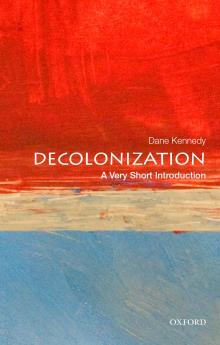By John DiConsiglio
In the mid-20th century, millions of people in Africa, Asia and around the globe lived under the colonial rule of overseas empires. Britain’s dominion spanned the continents, reaching from India and Pakistan to Palestine and Burma. From the French-controlled territory in Algeria and Vietnam to the American Philippines, a world map from the 1940s displayed a patchwork of imperial powers.
By the end of the century, that map had been radically redrawn. In the space of an historical blink of an eye, European empires collapsed and nearly all of their former foreign subjects became citizens of independent nation-states. The United Nations grew from 51 members at its founding in 1945 to 193 today. The imperial era came to a swift and certain close.
But that’s not the end of the story, according to Dane Kennedy, the Elmer Louis Kayser Professor of History and International Affairs, in his new book Decolonization: A Very Short Introduction (Oxford University Press, 2016). Despite attempts by both ex-imperial states and post-colonial regimes to promote a sanitized version of decolonization—one that characterizes the transition as a peaceful transfer of sovereignty—Kennedy asserts, “Nothing could be further from the truth.”
“In reality, decolonization was a violent, fiercely contested process that left lasting scars on the world we inhabit today,” he said.
Kennedy explained how the legacy of decolonization—such as widespread violence and mass refugee crises—spawned conflicts that still persist, from tensions between India and Pakistan to Great Britain’s “Brexit” from the European Union.
 Q: Let’s start with the basics. What exactly is “decolonization”?
Q: Let’s start with the basics. What exactly is “decolonization”?
A: If we look back at the colonial world before 1945, it’s a world that is ruled mainly by Western European countries—most predominantly the United Kingdom but also colonial empires like France, Holland, Belgium and Portugal. They ruled peoples from parts of the Americas (mainly in the Caribbean) to almost the entirety of Africa, along with large swaths of Asia and portions of the Pacific. Effectively, a huge amount of the world was under the control of foreign imperial authority.
But then there is an historic shift— stretching from the mid-1940s through the late 1970s—from a world of colonial empires to a world of nation-states. That’s what we refer to as “decolonization.” In the aftermath of the Second World War, we see independence for Britain’s South Asian possessions—India, Pakistan, Sri Lanka, Burma—as well as the American Philippines and British and French-controlled territories in the Middle East, notably Palestine/Israel, Jordan, Lebanon and Syria. By the 1960s, European colonial rule had collapsed across the rest of Asia, North Africa and most of sub-Saharan Africa, where more than 30 new nations came into existence. Then we see the end of the Portuguese empire in Africa and East Timor, the collapse of the renegade Rhodesian white regime and independence in various Pacific Island and Caribbean nations. By the end of the ’70s, the decolonization deluge has largely swept away the Western colonial empires.
Q: In your book, you say there has been an historical rewriting of decolonization to make it appear like a bloodless negotiation process rather than a violent upheaval. Can you explain this line of thinking and how it came about?
A: Both the ex-imperial powers and the new nation-states had incentives for white washing the past. An empire like Britain’s whole rationale for colonial rule was to bring the benefits of civilization—the so-called “white man’s burden”—to these people and shepherd them towards self-rule. They shrugged off the cruelty they had imposed for hundreds of years by saying, “Sure, there were problems, but, for the most part, we managed this process with great equanimity and deserve to pat ourselves on the back.” Likewise, the rulers of the new nation-states that arose from these colonies had their own reasons to rewrite history. Their claims of national identity often entailed suppressing those within their own societies that envisioned an alternative political future. That often involved cases of ethnic cleansings and mass migrations.
Q: So, the decolonization process was anything but stable and peaceful?
A: Correct. Look, most of us would agree that nation-states, because they are premised on sovereignty derived from the people, represent a more attractive political option than foreign empires imposing rules from afar. But we also must recognize that this transition came with costs. Decolonization in the Indian subcontinent, for example, was an extraordinarily bloodied process, resulting in the deaths of literally millions of people and the mass migrations of millions more. The decolonization of French Algeria produced over a million refugees and hundreds of thousands of deaths. Huge death tolls accompanied the Vietnamese wars for independence and Angola's struggle against Portuguese rule. These are costs that we are still paying today.
Q: Can you elaborate on that? Where do we see the scars of decolonization today?
A: Many regions face enduring conflicts that have their roots in decolonization. Again, look at India. Since independence and partition, there have been three wars between India and Pakistan. Most experts would agree that if there is going to be a future nuclear exchange, those are the two nations where it is most likely to happen. Tensions persist throughout the Middle East following the transition of the British colony of Palestine into the state of Israel. It shows no signs of stopping. There are examples in Africa. In the Congo, the collapse of Belgium rule resulted in ethnic rivalries. It is a huge country that still has never fully successfully integrated as a nation-state. Millions of people have died in conflicts there since independence—conflicts that can’t be separated from decolonization. I could go on and on.
Q: And as for the ex-imperial powers? How are they feeling the legacy of decolonization?
A: You need look no farther than what just happened in Britain with the “Brexit” from the European Union. That cannot be divorced from its long heritage as an imperial power. Those who campaigned for Brexit were promoting a vision of Britain that draws on a nostalgic memory of its imperial past. Hail Britannia, if you will. It’s a nationalistic vision that is tied to a loss of empire. Brexit is embracing a vision that’s no longer available to them. As an historian, I want people who read my book to appreciate that decolonization was a complex and difficult process that still has not been fully resolved. Perhaps it never will. We can trace the problems we face today back to events that were put in motion more than half a century ago.


